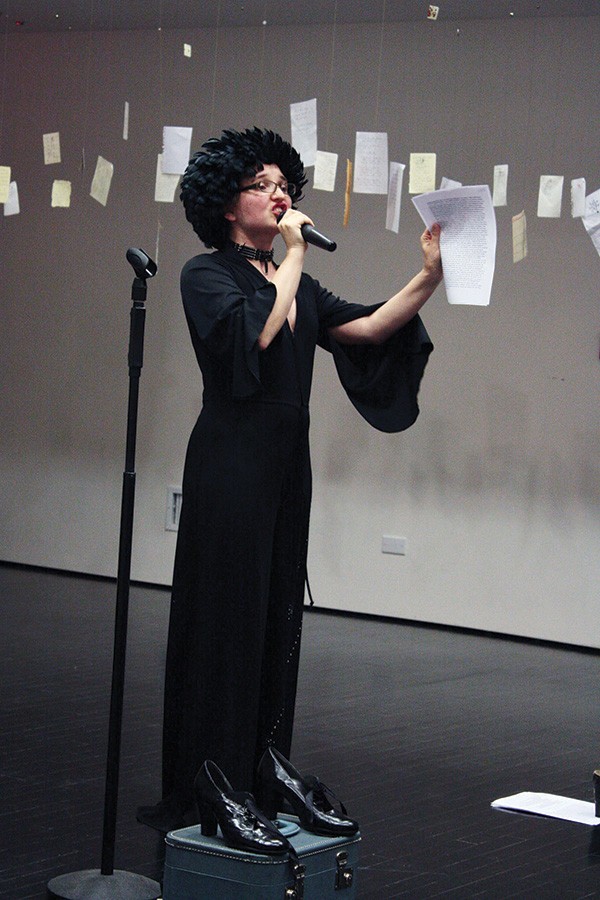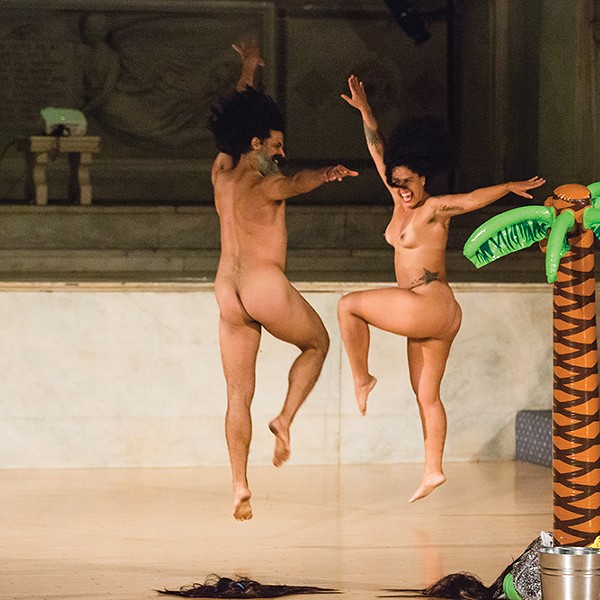Cynthia Hopkins describes her work as "epic folkloric narratives." Born in Fitchburg, Massachusetts, in 1972, Hopkins majored in American Civilization at Brown University, and went on to create six performance works, three of them composing the "Accidental Trilogy," one theme of which was her struggle with alcohol and drugs. Often in her performances Hopkins adopts alter egos—cartoonish personalities in vaudevillian costumes. She has recorded eight albums on which she sings and plays accordion, piano, guitar, and musical saw. Hopkins's band, Gloria Deluxe (1999-2009), combined German cabaret, folk, and country influences. In 2007 she founded a nonprofit organization called Accinosco (Accidental Nostalgia Company). She lives in Williamsburg, Brooklyn.
Hopkins's show addressing global warming, "This Clement World," appeared at Mount Tremper Arts in 2012. A full-scale performance of the work, with an 11-piece chorus and band, played the Walker Art Center in Minneapolis. In her latest show, "A Living Documentary," Hopkins plays five characters: a mumbling youth, a "celebrated American playwright," a patron of the arts, a career development expert, and a Fat Lady. Hopkins will perform "A Living Documentary" at Mount Tremper Arts on August 15 and 16. (845) 688-9893; Mounttremperarts.org.
—Sparrow
Sparrow: Hello.
Cynthia Hopkins: Can you hear me okay? I'm in a car, going to a wedding, with my husband. I'm surrounded by trucks!
What was the genesis of "A Living Documentary"?
I set out to make a piece about earning a living in the performing arts, which forced me to confront the unsustainable situation I was in: running a nonprofit company to produce large-scale works. Basically what the story tells was my decision to fold that company. To make this piece a "living documentary," I didn't spend any money on it, I didn't hire anybody to work on it, so any money that I got paid, I used to live—in stark contrast to previous productions where I would fundraise, pay for a lot of personnel and equipment, and usually what would get cut would be my own salary.
There's been a lot of talk lately about the gentrification of New York City. When people ask, "Will the arts survive in New York City?" they don't mean Laurie Anderson and David Byrne. They're talking about people like you.
That's absolutely true. There's that Patti Smith interview where she said if you're a young artist making experimental work, New York is not the place you want to live right now—which is true. And I think it's sad. But there're plenty of other places to be.
So in this piece you never appear as yourself? You're always in character?
I'm always a character when I speak. I sing a couple of songs live, as myself, in the middle of the piece.
And in those pieces you dress as yourself?
Actually, I'm totally naked when I sing them. [Laughs.] So I'm really myself.
Is that because you were thinking, "How do I dress as myself?" and you decided, "I'll just be naked"?
The piece is structured as a palindrome: The two halves of the piece are mirrors of each other, so the center needed to be a black hole. There is total blackness at the center—you just hear audio in the darkness—and flanking that black hole are the songs in the nude.
I should tell you that I am a fanatical palindrome writer; I've written over 1,100 of them. One of my most recent palindromes is: "Star Wars: raw rats."
[Laughs.] Thanks!
Did you always struggle with money, as an artist?
Early on in my career I did a lot of other jobs and made a living that way; the artwork was separate. But as I started to produce these shows with the nonprofit company, it became a full-time job, which meant that I became a producer and fundraiser. I was spending as much time, if not more, doing what was peripheral to the art itself—and it was work I didn't want to do.
It's interesting that the same problem appears over and over again, whether you're a waitress or running a prestigious theater company: how to make money.
I read some reviews of the show, and all of them mentioned that it doesn't offer any solutions to this problem, but to my mind the show is the solution. "A Living Documentary" was made with me earning my living from it. So what I'm trying to imply, and what the career development character says explicitly, is that it is possible to make a living as an artist. You just have to insist upon profiting from your work, to say, "Yeah, if you pay me a sufficient fee, I'll do the show. And if you won't, I won't."
I just realized that my day job, to make money, is this interview. It pays for me sitting in bed writing palindromes.
You know, I'm going to have to jump off the phone here in a minute. We're about to get to where we're going.
Oh, you're at the wedding!
Well, we're not going to the wedding. We're going to a rehearsal for the music for the wedding.
I hope you get paid for it.
Oh no, this is a gift.















